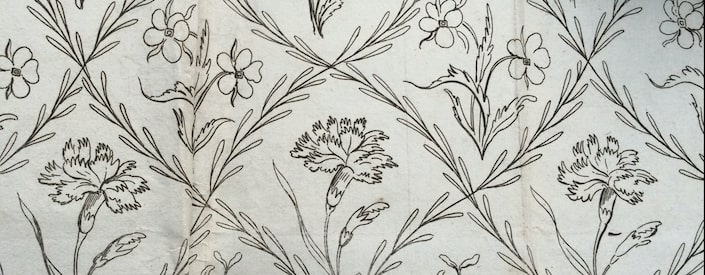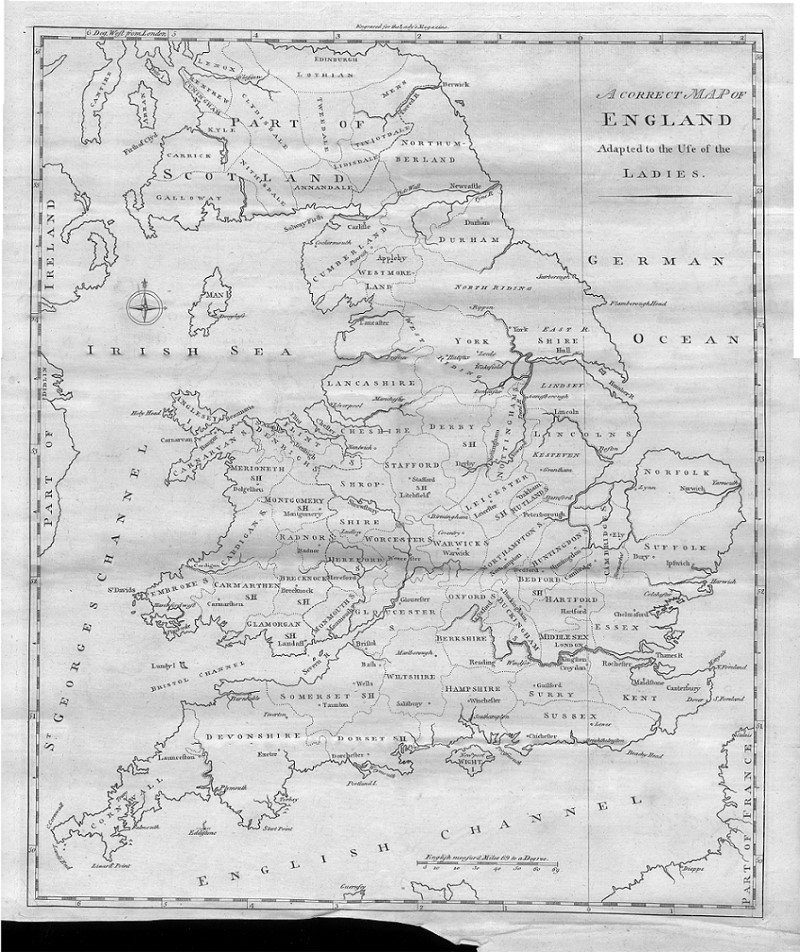Dublin Core
Title
A Correct Map of England Adapted to the Use of the Ladies
Subject
map sampler; household object; fire screen
Description
Pattern in the Lady's Magazine.
This map sampler pattern was one of five printed in the magazine between 1776 and 1781. The maps were introduced following a request from a governess who wanted to use them with her charges. The governess's suggestion was passed on to the magazine's editor in the form a short essay in the Lady's Magazine for August 1776 entitled 'On the Utility of Geography in a Female Tuition'. The author of the essay explained that georgraphy was a desirable subject for women's education, in part because it would help 'to render history intelligible'. The maps were to be 'executed in needle-work, on canvas' and 'afterwards applied to the purpose of a fire-screen, or framed for an ornament to the room'. The editor appended a note to the essay explaining his readiness to include the map patterns despite the considerable cost of commissioning the engravings. He wrote: 'we value no expence to render our collection beneficial to [our readers], because their benefit is our greatest glory' (405). Each map was accompanied by an essay on the history of the country or continent drawn on the pattern.
Originally, the magazine intended the October 1776 issue to contain a sampler pattern for a map of Europe. In the Correspondents page of the November 1776 issue, the editor was forced to apologise to readers for advertising the wrong pattern, an error which occurred as a result of a 'mistake [by] the engraver, who copied that of England in its stead'. A map of Europe followed, but not until October 1778.
Many map samplers from this period have survived, included many embroiderred maps of England worked by schoolchildren. To date, no exact replica of this map has been identified.
This map sampler pattern was one of five printed in the magazine between 1776 and 1781. The maps were introduced following a request from a governess who wanted to use them with her charges. The governess's suggestion was passed on to the magazine's editor in the form a short essay in the Lady's Magazine for August 1776 entitled 'On the Utility of Geography in a Female Tuition'. The author of the essay explained that georgraphy was a desirable subject for women's education, in part because it would help 'to render history intelligible'. The maps were to be 'executed in needle-work, on canvas' and 'afterwards applied to the purpose of a fire-screen, or framed for an ornament to the room'. The editor appended a note to the essay explaining his readiness to include the map patterns despite the considerable cost of commissioning the engravings. He wrote: 'we value no expence to render our collection beneficial to [our readers], because their benefit is our greatest glory' (405). Each map was accompanied by an essay on the history of the country or continent drawn on the pattern.
Originally, the magazine intended the October 1776 issue to contain a sampler pattern for a map of Europe. In the Correspondents page of the November 1776 issue, the editor was forced to apologise to readers for advertising the wrong pattern, an error which occurred as a result of a 'mistake [by] the engraver, who copied that of England in its stead'. A map of Europe followed, but not until October 1778.
Many map samplers from this period have survived, included many embroiderred maps of England worked by schoolchildren. To date, no exact replica of this map has been identified.
Creator
The Lady's Magazine (1770-1819)
Source
The Lady's Magazine, vol. 7 (1776)
Publisher
G. Robinson, No. 25 Paternoster Row
Date
October 1776
Contributor
Jennie Batchelor
Rights
Cardiff University Special Collections and Archives
Format
paper pattern
Language
English
Type
paper embroidery pattern
Identifier
LM080

